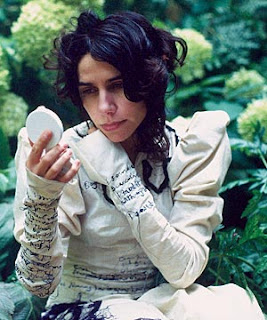
Polly Jean Harvey appears to have travelled over land and sea to arrive at her latest album, and it’s been a journey capturing every salty droplet and breathy wind from lands afar. Let England Shake shows just how wide one artist can fan her tail feathers of diversity, and push ego aside to sing from the back of the stage. But still I’m not quite bowled over by it‘s brilliance…
This time around Harvey refrains from directing her own emotional experience instead to channelling the world’s angst through the eyes of the bystander. Reuniting with long-term producer and collaborator John Parish, the qualms of our native England are caressed compassionately and only exchanged temporarily whilst the country’s vocalist turns her attentions toward the eastern world.
The approach of an artist such as Bob Dylan, who was quickly labelled as a protest singer in the 1960s for channelling observations from outside of his immediate vision. But just as Dylan did not intend to sing anthems of rebellion, it must be stressed that this is not a protest album. It is instead a political commentary of sorts- not to cast the album in a diminutive light- but rather to illustrate the passive means adopted by Harvey to voice the world’s affliction.
Let England Shake starts with it’s title track, which jingles and jangles away somewhat akin to a child’s rhyme and addresses an impending doom; to be brushed off blithely by the line ‘laugh our loud’. A satirical start. The album as a whole bears an archaic quality as though it’s been hundreds of years in the making; having been crafted amidst monasteries, nunneries and far out in the Wiccan woods. Camp fire sessions perhaps?
Recording took place in a 19th Century church in Dorset which is positioned atop of cliff overlooking the sea. Is it possible to hear such an influence? I can only imagine staring out across the expanse, directed toward the countries of great conflict and venting an empathetic wind from the town I‘m most connected to. At this point I begin to wish I was in another country, with a warmer climate and less chance of getting blown of a cliff such as this…
Polly Jean IS a musical genius, and now she’s practically cemented the fact. The depth of the composition woven from sound through lyric now ascends the ages, and proves to show that what is now the eighth album from Harvey is possibly the most accomplished. A stand-out line from the song All and Everyone pertains that "Death was in the stare of sun, fixing it’s eyes on everyone". Beautifully personified and a perfectly universal metaphor.
It has indeed been worked towards, and there have been some rather impressive records along the way to contend; such as Bring Me To Life- which was brought to life when Harvey went solo in ‘93- and further down the line- Stories from the City, Stories from the Sea. With lyrics including ‘I can’t believe life’s so complex when I just want to sit here and watch you undress’, and ‘How long must I suffer? Dear God I’ve served my time..’ A selfless jump has been made at some point in order to reach Let England Shake.
But with depth and intelligence pushed aside, how well can this album stand up on audible values alone? Yes it’s nice that a sense of passivity emanates from Harvey as opposed to our ears being drummed like we’re receiving history lessons on Nazi war camps by a defensive German. But what’s really important when you’re buying an album?
As much as I admire Polly Jean and so many of the moves she makes in her career; I would not spend time listening to this album once having checked what it’s all about. And I feel that I should apologise for this somehow. But compared to previous albums containing no two songs alike, we’re suddenly presented with not only a running theme- but also some very similar songs. It gets repetitive and quite hard work to identify the discrepancies between from track to track. You can hear the power that PJ has collected in her voice over the years, yet without the warrant to tap into the full emotional array of it. Some will be pleased she has moved more toward folk and away from raw angsty blues- as I am pleased that she bears the ability and the diversity to arrive at such a sound.
I will close with a line from the song England, which at track seven summates Harvey’s mindset during her fresh new decade. Let the words "I live and I die through England" align your mind for the listen; and then may you Let England Shake…





